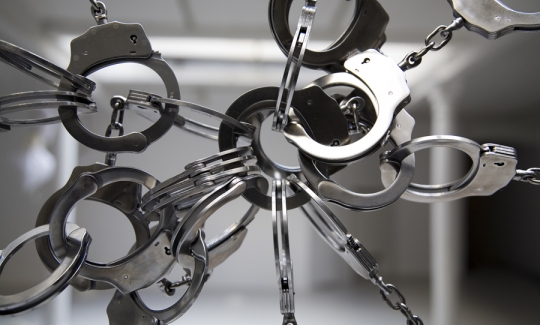Curator: Tami Katz-Freiman
As a member of the North African (Algerian) community living in Paris, Kader Attia examines the problematics related to the tangle of identity conflicts experienced by Muslim immigrants to France. His artwork is anchored in the charged encounter between the immigrants' Oriental culture and Western consumer culture. Deeply rooted within this duality, his work reflects upon the socio-political powder cake that is threatening French society from within, and upon the millions of Muslims who have lost all hope of integrating
into it.
Attia's social criticism has been given expression over the past ten years by means of sculpture, photography, drawing, installation and video art; his work is characterized by a reflective spirit suffused with personal pain, and it vacillates between humor and despair. This exhibition contains seven works by Attia. Some of them were especially created for the Museum following a process of reflection on the complexity of an Israeli society struggling to maintain a semblance of coexistence, and on an ongoing conflict that has no foreseeable resolution.
Kader Attia was born in 1970 in Dugny, France, to a family of Muslim immigrants from Algeria. He grew up in the multicultural atmosphere of the Sarcelles neighborhood on the outskirts of Paris - an area with a large concentration of mostly Muslim and Jewish immigrants who lived side by side in relative harmony. Alongside early works - mainly photographs and videos - characterized by an anthropological quality, Attia has created a distinct body of works that focus on the implications of demographic changes in France following the influx of Muslim immigrants, and on the encounter between their religious practices and Western consumer society.
Lately, Attia's work has taken a darker, yet more poetic turn. Childhood memories from the suburbs; echoes of their crowded gray architecture and of the poverty and sense of oppression that pervaded them; and of course the echoes of riots and of police brutality - all of these seem to have filtered into the works. They have given birth to a more abstract urban poetics that demands the involvement of the viewer, yet which is no less poignant in terms of the social criticism it contains.
An overall examination of the various components of this current project - which initially appear markedly different from one another - reveals a web of representations and signs from which one may extricate an almost narrative meaning, centered upon a view of religion as a system parallel to consumerism. As a producer of brand names that encourages a form of irrational allegiance, religion - like capitalism - exploits human weakness and desires, above all the desire to belong. In this exhibition, Attia thus protests against the helplessness of the victims of both these systems; he similarly protests against expressions of racism and against the exclusion of the Other. The elusive, complex and conflicted identities represented by Attia derive form a rich poetic language; this language allows for a fresh and inspiring examination of the cultural tensions that characterize this moment in time - not only in Europe but also, to a large degree, in the context of Israeli reality.

